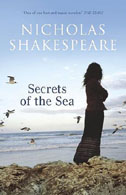 | Reviews of Secrets of the Sea by Nicholas Shapespeare Harvill/Secker August 2007 |
[This novel has been longlisted for the 2008 Miles Franklin Award.]
From the publisher's page
Following the death of his parents in a car crash, eleven-year-old Alex Dove is torn from his life on a remote farm in Tasmania and sent to school in England. Twelve years on, he must return to Australia to deal with his inheritance. But the timeless beauty of the land and his encounter with a young woman, whose own life has been marked by tragedy, persuade him to stay.They marry, and he finds himself drawn into the eccentric, often hilarious dynamics of island life. Longing for children, the couple open their home to a disquieting guest, a teenage castaway, whose presence on the farm begins to unravel their tenuously forged happiness, while at the same time offering the prospect of a much greater fulfilment. SECRETS OF THE SEA is Nicholas Shakespeare's finest novel to date.
Reviews
Jennifer Byrne in "The Age": "It is a fine thing that English writer Nicholas Shakespeare has chosen to live in Tasmania, a place that has lured many wandering souls. And it is understandable he would wish to write about it while
his love is still new, that extreme, other-worldly beauty fresh to his eyes...The island's fractious, fascinating history is the subject of his recent prize-winning nonfiction, In Tasmania. Now, its east coast is both the setting and animating spirit for a novel set in the imagined town of Wellington Point (pop. 600), where old folk bask in the high daily average sunshine and the young can't wait to escape...Shakespeare is a polished writer and this is a novel of fine detail, of long walks on the seashore and moods that shift like the pink in the clouds and the dark, wheeling patterns of birds. We watch and wait as small-scale lives tangle and smooth against a bold, at times bruising landscape."
Alfred Hickling in "The Guardian": "Shakespeare takes great care not to replicate the contents of his travel book, though it's difficult to write about an island of less than 30,000 square miles without covering some of the same ground. And whereas the travelogue was a slightly chaotic work written in a burst of enthusiasm, the novel is far more crafted, considered and detached - not always to its advantage. It can be painfully slow-moving at times. And there is more than enough material on the reproductive cycle of molluscs to give you pause next time you enter an oyster bar...If Shakespeare's travel book captured the excitement of arrival, this novel is about coming to terms with the destination."
Margaret Elphinstone in "The Independent": "The opening seems to hold the sea at bay as it focuses on small-town rivalries in machismo and sexual relationships, before showing us unequivocally why we should care. The sea always comes in again and washes away the trivia, but sometimes it takes a little too long to make its appearance. Engagement with the sea, and its significance in the unplumbed depths of the human psyche, is the real, undoubted strength of this novel."
Kasia Boddy in "The Telegraph": "The story proceeds at a leisurely pace. Eighteen years are covered in five sections, but the time frame is complicated. Life is long but not all of it matters equally. Some sections cover years, some months; others - a few meaningful days in the characters' lives...To slow the tale down and emphasise significance, Shakespeare employs a variety of techniques. For every three normal-length paragraphs, for example, he breaks one into four pieces, giving each sentence room to resonate moodily...Literature looms large. After Lear's verse, the book most often mentioned is Joseph Conrad's The Shadow Line (1917), the story of a young sea captain whose ship seems haunted by his predecessor. Secrets of the Sea is proudly haunted by Conrad and develops his preoccupations with the shadow lines drawn between men who seem like doubles, between the natural and the supernatural, and, finally, between youth and maturity."
Short notices
Fuller Bookshop: "A curious and unsettling novel, you will confound yourself trying to will the non-existant East Coast town into existence."
Other
Susan Wyndham interviews the author.
